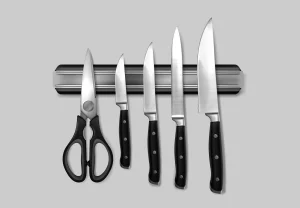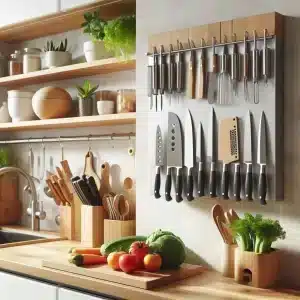In recent years, bamboo has surged in popularity as a sustainable and stylish alternative in the world of kitchenware. As more consumers turn to eco-friendly options, bamboo kitchen utensils have become a common sight in many homes.
But amidst their growing popularity, questions about their safety and durability persist. Are bamboo kitchen utensils truly safe for everyday cooking? In this comprehensive guide for 2024, we delve into the properties of bamboo, examine its safety credentials, and provide essential care tips to ensure you can use these eco-friendly tools with confidence in your kitchen.
Bamboo Utensils Pros
Compatible with Non-Stick Surfaces
Bamboo utensils are gentle on your cookware, perfect for those who use non-stick pots and pans. They won’t scratch or damage the surface, extending the life of your kitchen essentials.
Scratch-Resistant
Thanks to their natural hardness, bamboo utensils resist scratches. This not only keeps them looking new longer but also helps ensure they won’t harbor bacteria as easily as scratched utensils might.
Eco-friendly & Decomposable
Bamboo is a sustainable choice. It grows quickly, requires no pesticides, and when you’re ready to replace your utensils, they can biodegrade back into the earth, reducing landfill waste.
Environmentally Friendly
Using bamboo helps reduce the reliance on plastic and other non-renewable resources. It’s a win for your kitchen and a win for the planet, as bamboo’s cultivation is kind to the earth.
Heat Insulating
Forget about handles that heat up. Bamboo’s natural properties keep it cool to the touch, even when stirring a steaming pot of soup or flipping ingredients in a hot pan.
Stain and Odor Repellent
Bamboo doesn’t absorb odors or stains easily, which means your garlic-infused stir fry won’t leave lasting memories on your spoon. This makes them simple to clean and ideal for use with strongly flavored foods.
Long-Lasting
While bamboo is naturally durable, taking proper care of your utensils by washing them gently and not soaking them in water will help them last even longer and stay looking beautiful.
Robust
Despite their light feel, bamboo utensils can withstand the pressure of cooking without snapping. Whether you’re mixing thick dough or stirring hearty stews, bamboo stands up to the task.
Featherlight
Lightweight and easy to handle, bamboo utensils won’t tire out your arms, making cooking more comfortable, especially for those with arthritis or hand pain.
Fashionable
Each bamboo utensil is unique, featuring distinctive grain patterns that can add a touch of organic elegance to any kitchen. Their natural look is not only stylish but also a conversation starter about sustainable living.
Bamboo Utensils Cons
Requires Proper Disposal
While bamboo utensils are biodegradable, they still require proper disposal. They should be composted rather than thrown in the trash to ensure they break down effectively and return to the earth without contributing to landfill waste.
Not Dishwasher Safe
Bamboo utensils are not suited for the dishwasher. The high heat and prolonged exposure to water can cause the bamboo to warp, crack, or lose its natural oils, shortening its lifespan.
Prone to Breaking Compared to Metal Cutlery
Bamboo utensils, while robust for day-to-day use, are not as strong as metal cutlery. They can break under excessive force or if dropped, especially as they age and become more brittle.
Higher Transportation Costs
The transportation of bamboo utensils can be more costly compared to local products. Bamboo primarily grows in specific regions, and the costs associated with shipping them globally can add up, reflecting in the final purchase price.
Limited Color Availability
Bamboo utensils typically come in their natural wood color. For those who prefer kitchen tools in various hues to match their decor, bamboo may not offer as much variety as other materials like plastic or silicone, which are available in a wide range of colors.
Costly
Due to their eco-friendly nature and the processes involved in responsibly sourcing and manufacturing them, bamboo utensils can be more expensive than their plastic or metal counterparts. This can be a barrier for some consumers looking to switch to greener products.
How to Clean Bamboo Utensils
Cleaning bamboo utensils properly is key to maintaining their beauty and longevity. Here’s how to do it:
- Hand Wash: Always wash your bamboo utensils by hand with warm water and a mild dish soap.
- Use a Soft Sponge: Avoid using abrasive scrubbers. A soft sponge or cloth is gentle enough to clean without scratching the surface.
- Dry Immediately: After washing, do not let bamboo utensils sit in water. Dry them immediately with a towel to prevent warping and cracking.
- Regular Oiling: Occasionally, rub a small amount of food-safe mineral oil into the bamboo using a clean cloth. This helps to maintain its natural color and prevent the bamboo from drying out.
- Avoid Prolonged Soaking: Never soak bamboo utensils in water for long periods. This can cause the wood to swell and split.
- Store Properly: Store your bamboo utensils in a dry place to avoid moisture buildup which could lead to mold or mildew.
Alternatives to bamboo utensils
Bamboo utensils are popular for being eco-friendly and biodegradable, but there are several alternatives that might also be appealing depending on specific user needs:
- Recycled Plastic Utensils: Some companies are manufacturing utensils using recycled plastics, offering an eco-friendly option that reduces the amount of plastic waste in landfills. These utensils are usually lightweight and economical, although not as durable as stainless steel or silicone.
- Compostable Utensils: Made from other natural materials like corn starch or potato starch, these utensils are biodegradable and offer an alternative to bamboo for those looking to reduce their environmental impact. They are particularly useful for events and locations where disposable but environmentally friendly options are preferred.
- Stainless Steel Utensils: These are extremely durable and heat-resistant, making them ideal for a wide range of cooking uses. Although stainless steel is not biodegradable, its durability means it does not need to be replaced often, reducing the amount of waste generated over the long term.
- Silicone Utensils: These utensils are flexible, non-toxic, and can withstand high temperatures without melting or emitting harmful substances, making them safe for use on any cooking surface. Additionally, silicone is non-porous, which prevents the buildup of bacteria and odors, and they are dishwasher safe, making them easy to clean.
- Wooden Utensils: Similar to bamboo, wood is another eco-friendly option that does not scratch cooking surfaces. Wooden utensils are generally made from sustainable materials like olive or beech wood. However, they require a bit more care to keep them in good condition, such as immediate drying after washing and occasional treatment with oil to preserve the wood.





